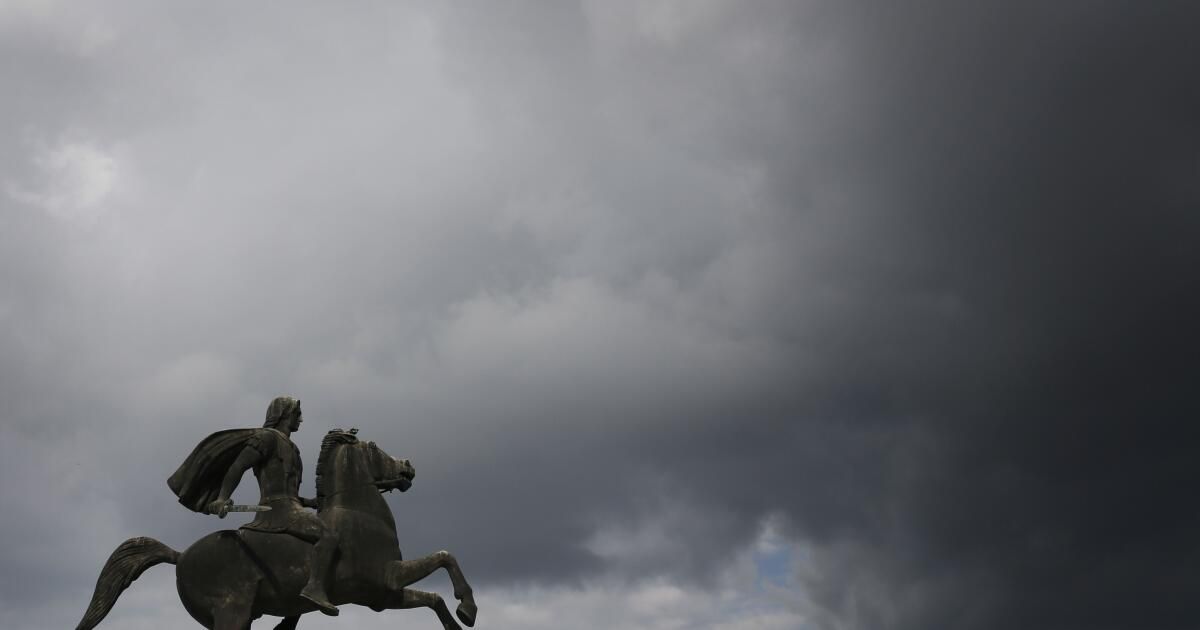Book Review
Alexander the Great at the End of the World: The Forgotten Final Years of Alexander the Great
By Rachel Kousser
Mariner Books: 416 pages, $35
If you purchase books linked on our site, The Times may earn a commission from Bookshop.org, whose fees support independent bookstores.
Alexander, the brilliant young Macedonian king known as “the Great,” has often been compared to the mythical Greek hero Achilles. Both were beloved by their soldiers and were nearly invincible. But accounts of Alexander’s life resemble the story of another legendary figure, Icarus, in that his martial skill, good fortune, and ambition took him too far. In his attempt to reach the end of the world as he knew it, Alexander flew too close to the sun.
The later years of Alexander's life have often been used by historians to impart numerous moralizing lessons, often rooted in anti-Asian racism. Even in life, Alexander faced criticism that his campaign in Asia corrupted him. As he conquered more lands, so the story goes, he became megalomaniacal: unnecessarily violent, easily offended, and preoccupied with conquest. In this version of the narrative, Alexander's offenses accumulated to the point that some historians insisted that he could not have died of natural causes and must have been murdered.
So Rachel Kousser’s new biography, “Alexander at the World’s End: The Forgotten Final Years of Alexander the Great,” is a breath of fresh air on the subject. Kousser accurately sums up the myth of “Alexander’s journey from honorable Macedonian monarch to corrupt and violent eastern despot” and then devotes a few hundred pages to refuting it.
Rather than tackling his entire life—a daunting prospect given that ancient biographies of Alexander sometimes ran to 10 volumes—Kousser focuses on his most maligned years, from 330 to 323 B.C.E., a relatively brief but intense period that solidified his legacy.
It may be an exaggeration to say that those years were “forgotten,” as the book’s subtitle says: Alexander’s life was obsessively documented and embellished. However, it is fair to say that many historians have not given those years the recognition they deserve compared to the glorious days of Alexander’s meteoric rise. They were the years of his losses, failures, risky situations, and a disappointing death.
Kousser brings us into the story just in time for the infamous burning of Persepolis, the jewel of the Achaemenid Persian Empire. By this time, Alexander had already consolidated his power, conquered Asia Minor and founded Alexandria. When he burned Persepolis, he had just returned from Egypt, where he had proclaimed himself the son of a god.
Alexander's destruction of the Persian city after emptying its treasury is often seen as the beginning of his despotic downfall. But, as Kousser shows, he lived to regret the fire. As he pursued conquest across Asia, he soon realised that divine fury and scorched-earth tactics were doing him no favours.
It should come as no surprise that Alexander learned new and better ways of ruling as he grew older. He was just 25 when he pursued his enemy Darius III, the last Achaemenid king, across Persia, so he wasn't old enough to hold on to his ways. And yet, that's not how the story is usually told.
Kousser highlights the many lessons Alexander applied to building his empire. He shows how he learned to negotiate, control his impulses, and integrate different cultures. His Alexander is not only cosmopolitan, but also intent on creating a multicultural empire. Despite his mistakes, Kousser writes, Alexander exhibited “courage, resilience, and an open-minded flexibility uncommon for his age—or any other.”
Nor should it be surprising that this led to conflicts with those who defended the status quo. For the Greeks, convinced of their superiority over the peoples of Africa, Persia and India, Alexander’s egalitarian approach was galling. When their governors undermined him, they were punished not only swiftly but equally, Kousser notes, regardless of their origin.
Kousser’s biography extends beyond Alexander’s military movements and into his emotional life. He treats his lifelong dream of seeing the end of the world—and the frustration of that dream—with appropriate emotional weight. He examines his relationship with his friend and general, Hephaestion, and his deep grief at his death, with the help of historical context and archaeological evidence. He brings to life the charisma that must have inspired immense loyalty in his soldiers, even when they were disaffected.

Raquel Kousser
(Nina Subin)
And yet Kousser is no apologist. While she treats Alexander with a compassion not typically found in accounts focusing on his military achievements, she holds him accountable for his mistakes. She also details his attempts to rectify those mistakes and learn from them.
Importantly, Kousser does not rely solely on Greek accounts of Alexander’s life, which tend to ignore the populations of the places he conquered. Through cuneiform tablets from Babylonian astronomers, Aramaic inscriptions found in modern-day Afghanistan, and archaeological remains from his conquests, Kousser brings to light the forgotten perspectives of the conquered as much as he considers their conquerors. His account is exhaustively researched (many chapters extend beyond 100 footnotes), yet remains accessible.
Kousser is, above all, a teacher with a lesson to teach us. She contrasts favorably Alexander's attempt to create an integrated, multicultural kingdom with later European efforts to “civilize” conquered subjects. Although perhaps he A proto-imperialist, Alexander celebrated and honored the diversity of the peoples he conquered.
Although thousands died, the survivors were part of the most diverse kingdom in antiquity. Alexander never tried to enforce conformity to Macedonian culture or religion. He encouraged Persian rule, Indian philosophy and interfaith marriages. In that, Kousser sees a road map to a multicultural future.
Kousser’s work is a much-needed addition to the historiography of Alexander’s life. In refuting the myth of Alexander’s downfall, he reveals that “the East did not corrupt the Macedonian king. Instead, from the beginning he contained within himself the seeds of all that he would one day become.”
Valorie Castellanos Clarkwriter and historian from Los Angeles, is the author of “Rebel Figures: Twenty Stories of Rebels, Transgressors, and Revolutionaries You've (Probably) Never Heard Of.”












